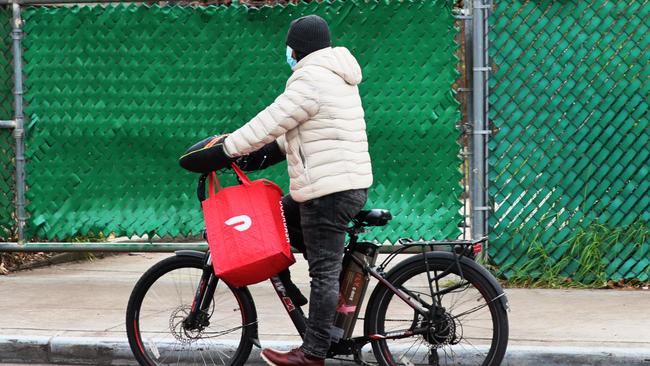‘As simple as Uber Eats’ – home deliveries of pharmacy drugs set to begin
A Melbourne-based start-up is tapping into the gig economy to provide Australians with speedy access to vital pharmaceutical medications.

Prescription drugs have become the latest items delivered via the gig economy as it matures from fulfilling late night hamburger orders and ridesharing, to ensuring medication arrives at your doorstep, even at weekends.
Melbourne-based start-up Medmate is set to launch in its home city, with plans to expand to Sydney, Brisbane, Perth and Adelaide, after running a successful pilot and three years of planning.
The business — led by GP Ganesh Naidoo and pharmacist Wael Hanna — has partnered with food delivery giant DoorDash to perform 24/7 door-to-door deliveries of pharmaceuticals.
Dr Naidoo developed the concept after his mother and some of his patients experienced difficulties fulfilling their medication, with non-adherent rates as high as 50 per cent.
He said Medmate would make “fulfilling prescription medications as simple as ordering a meal from Uber Eats”, processing medications electronically within 60 minutes.
“My mother has diabetes and is on multiple medications. She is in her late 60s now and when I had a look at how she was organising her medicines and was able to actually get them fulfilled from a pharmacy, she really struggled,” Dr Naidoo said.
“As a GP, when I reflected on the experience of my patients, I knew millions of Australians are struggling with getting their medications fulfilled from a pharmacy.
“When I look at whether a patient actually fulfils their medications and are adherent to their medications, a large percentage of patients are not. The literature does suggest somewhere between 30 and 50 per cent of patients on regular medications are not adherent.”
Dr Naidoo said there were several reasons for a patient not adhering to medications but the main one was logistics: “They simply find it too inconvenient, they forget and they run out.”
“We thought there was a (need for) simpler way for people to access their medications when they need them.”
Covid-19 has propelled growth in e-commerce and on-demand deliveries, fuelling a 170 per cent spike in Menulog’s takeaway orders. The pandemic has also seen GP telehealth consultations become more mainstream, particularly after they became covered under Medicare.
And it is the rise in remote GP consults that Dr Naidoo said made Medmate more of a necessity.
“There have been 50 million telehealth consultations in Australia in the past 12 months, and you could imagine that it makes no sense for a patient to have a telehealth consultation and then for the doctor to say “you need to get in you car now and drive to a pharmacy to have that medication fulfilled”.
“There is a reason why patients have telehealth consultations. They are either isolated, disabled or in pain. There is a reason they can’t come into their doctor for a face-to-face consultation so it makes no sense to force them to go to a bricks and mortar pharmacy.
“Medmate closes that loop with telehealth.”
Medmate has given pharmacies the option to use either their existing courier services to provide home deliveries or DoorDash.
DoorDash is an attractive option, given Dr Naidoo said many pharmacies did not have delivery services they could deploy at scale, with most of them using couriers for niche customers such as nursing homes.
While the gig economy was convenient, Dr Naidoo was aware of potential challenges, particularly when pharmaceutical medication and drugs of dependence are involved.
“It was an important problem that we needed to make sure was controlled by our delivery partners. Pharmacists have an obligation under their pharmacy guidelines to package medication for delivery in appropriate ways — it needs to be in tamper proof packaging and the contents of that packaging unknown.
“The drivers also undergo specific training. They essentially adhere to similar guidelines that they use for delivery of alcohol.
“So if there is a prescription in the package, the driver is unaware of the contents and instructed to review photo ID on delivery, the driver is tracked — we track all deliveries ourselves and so does DoorDash — so we are very aware of the position of that medication at any point in its journey.”
Dr Naidoo said during the pilot in Melbourne there had been no delivery issues across a range of medication deliveries.
“About 30 per cent of our orders are related to depression and anxiety. As a doctor, I think that’s fantastic news, seeing patients who are ordering their antidepressants on the weekend, in the evening and having that medication delivered to them within the hour.
“It just means that we now have a means for patients who are suffering from mental health conditions to be able to, in the privacy of their own home, have that medication delivered and maintain that continuity (of supply).”




To join the conversation, please log in. Don't have an account? Register
Join the conversation, you are commenting as Logout